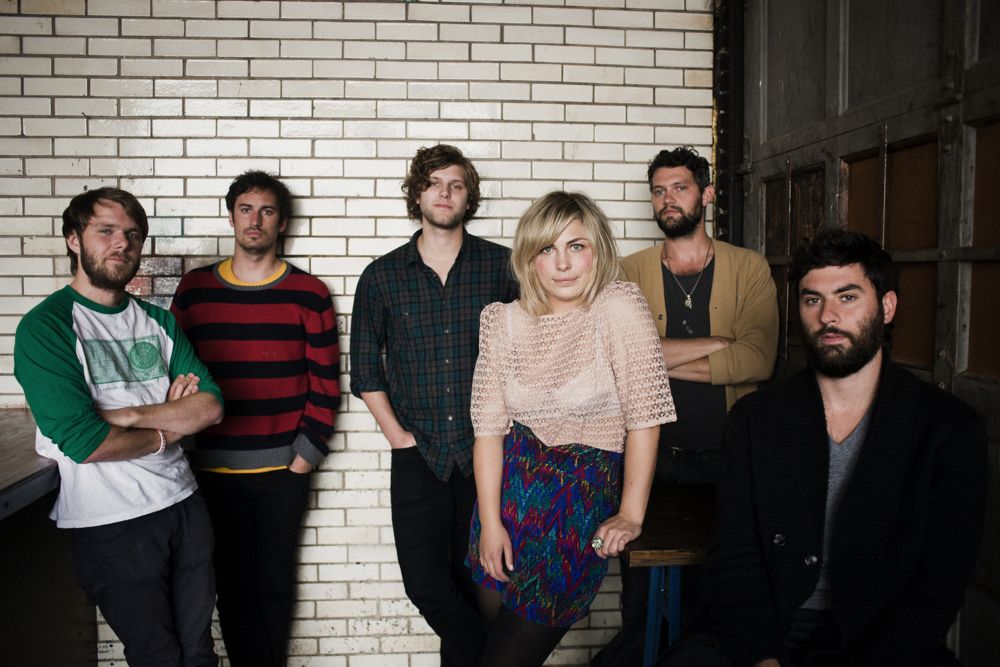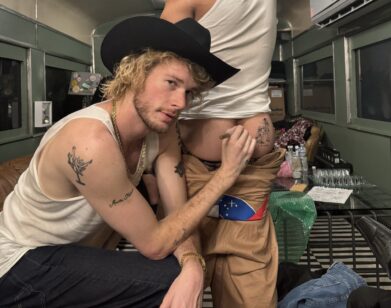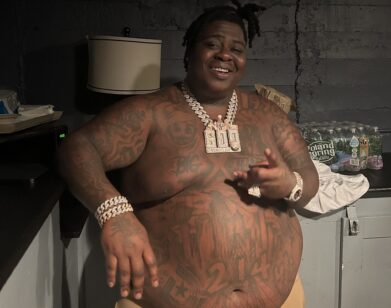Somewhere Between the Head and the Heart

ABOVE: THE HEAD AND THE HEART (LEFT TO RIGHT: JOSIAH JOHNSON, KENNY HENSLEY, TYLER WILLIAMS, CHARITY ROSE THIELEN, CHRIS ZASCHE AND JONATHAN RUSSELL).
The Head and the Heart have a very fitting band name; the earnest six-piece group from Seattle met at an open mic night and have a very making music for their own personal pleasure ever since. Fans have taken to the band’s unself-conscious ethos—their blend of lush, expert instrumentalism and intuitive, honest lyrics. Despite opening for popular acts such as Dave Matthews, and making the late-night talk show circuit, the band hasn’t lost their collective head or heart.
Interview caught guitarist and vocalist Josiah Johnson between independent radio station appearances, which the band still uses to maintain direct engagement with listeners. Topics of conversation included reversing the traditional “struggling musician-turned 9 to 5 office worker” paradigm and the current trendiness of indie-rock.
AMANDA DUBERMAN: How is the tour going? Is this your first head-lining tour?
JOSIAH JOHNSON: We did one last fall for around five weeks. That one was more kind of East Coast and West Coast, but less Midwest dates. We’re doing more of the South than we could do last time, just hitting different markets. But this is our second headlining tour. It’s going really well—most of the shows are selling out, the crowds a great, there is a really good energy.
DUBERMAN: Most aspiring musicians start off as just that—aspiring musicians—and the get a more conventional job if their music career doesn’t work out, but you did the opposite…
JOHNSOHN: I think I did that tradition the best [way round]. I tried other things and just couldn’t do them; I couldn’t make my brain function on a 9 to 5 schedule, just at a cruising altitude. After I graduated from college, I worked in an office doing web development. I woke up two years later realizing I hadn’t changed and hadn’t done anything interesting or grown. I just thought, “God I have to figure out something else to do.” I moved from Southern California up to Washington to try graduate school out. I remember in high school and college just having these moments of, you know, all of the things I was stressed and worried about in life just disappearing when I’m signing along to these songs that mean something to me. I always loved the idea of writing a song that could do for other people what those songs did for me.
DUBERMAN: The music sounds and interacts so naturally with itself, and the lyrics are so vulnerable, but you and the rest of the band haven’t known each other for very long. How did you all establish that chemistry and trust so quickly and so well?
JOHNSON: I met Jon [Russell], the other singer and primary song writer, first. We both had moved to Seattle recently, [we were] writing songs [individually] and we wanted somewhere to play them. When we met we both just admired each other’s songs and voices, [but] when we first started writing songs [together] we didn’t really hit a stride, and we just got bummed out. Then something clicked; we started figuring out what we could and couldn’t do to add to each other’s song. The harmonies thing wasn’t as intentional, but it added something to the songs. Neither of us can really play like, a sweet riff, but harmonies just kind of happened and we realized, “Whoa, these voices that sound really different kind of blend well together.” When we were finally a full band, everyone wanted to participate in writing the songs, [no one wanted] to just play along. Everyone in the band adds something that the other people couldn’t’ bring to the table on their own. We’ve had a lot of success in learning to trust each other regardless of differences in opinion.
DUBERMAN: It sounds like, since there’s this shared philosophy among all of you, everything just fell into place.
JOHNSON: Yeah [writing songs] is this weird, chaotic thing—all of these opinions and inputs come in—but I think we’ve learned to trust that the output of [our songwriting] is good even if it’s painful. [By] throwing all of it into the pot, you get results.
DUBERMAN: It seems like this isn’t a money making project—you made all these songs and released them yourself never knowing if you would get signed, or have such a larger following. How did that nothing-to-lose mentality infuence your songwriting?
JOHNSON: For years, when I didn’t think I was going to play music, I wrote songs and recorded them on my laptop. There are things that you can’t say in real life, but for some reason it’s okay to say if you put it in a song. That is the most incredible, therapeutic feeling. When we go to write songs, it’s mostly about capturing an experience or a [emotion] that you feel strongly about. After that, there’s an intellectual process where you arrange the song and that sort of thing. But when you go write a song you’re trying to get something off of your chest that couldn’t any other way. That’s how all of the songs start. Whenever you think you want to write a song, it doesn’t turn out nearly as well as when you think you just have to.
DUBERMAN: Now that you know people are listening to your music, do you feel more self-conscious about it?
JOHNSON: I definitely am worried about that. We’re not going to write about home and changes next time, because that’s not what we’re doing. We all live in Seattle and we’re not planning on changing anything, so it will be about different subjects. You hope that whatever that experience that we’re having and writing about is something other people identify with also, but you can’t really write about anything else and expect to care about it. Our songs don’t necessarily come from sitting down and jamming out a song, it’s more from living and feeling like you have to say something.
DUBERMAN: Do you compartmentalize the songwriting and touring process?
JOHNSON: I have a really hard time writing lyrics on the road, in the sense that being on the road is not life, it’s not normal. The songs that you write on the road are like “I miss home and my girlfriend is so far away,” or whatever. It’s not interesting to people or me. The creation, molding, and shaping of the songwriting process I can do on the road when have some time on the bus.
DUBERMAN: So the nature and content of the songs changes, but your approach to songwriting stays the same.
JOHNSON: We try and set up our tour schedule to give ourselves the space to be living and writing at the pace that songs naturally come, rather than forcing them out. It might not get back to that original, totally pure totally nothing-at-stake feeling, but to write from as pure a place as possible is definitely the goal.
DUBERMAN: You’ve played festivals and late night shows, but you maintain a commitment to playing at indie radio stations and record shops. Why is that important to you?
JOHNSON: You know how I was saying that I admired and loved that feeling that I got when I heard a song that I identified with and that made everything okay? When you play a huge show, who do I ever get to see identifying with the songs, and be rewarded with seeing their [reactions]? Trying to do things in smaller and smaller venues, and more intimate things, is really rewarding. I think being close to people that are affected by the music is one of the more rewarding parts of this for me.
DUBERMAN: Has your success surprised you? The indie-folk thing is kind of in vogue, for example Mumford & Sons.
JOHNSON: Totally, we’ve been really fortunate in that it’s hit at exactly the right time. It’s definitely a surprise to me. I guess we’re kind of tired of the word “Americana,” though. I don’t want to write a cute folk song; I want to write a great, epic thing that has a lot of feeling. That comparison is kind of old, but we’ve been really fortunate that that’s what people like right now, because there are so many good bands playing music that is just out of style and [so they] don’t get the breaks that we’ve gotten.
THE HEAD AND THE HEART ARE PLAYING AT TERMINAL 5 IN NEW YORK CITY THIS SUNDAY, MARCH 18TH.






